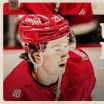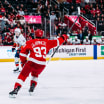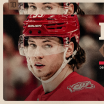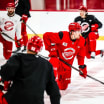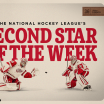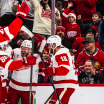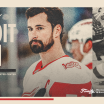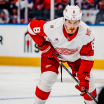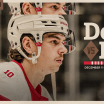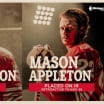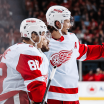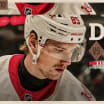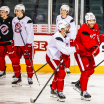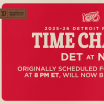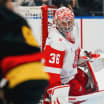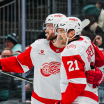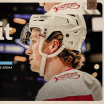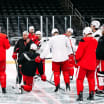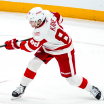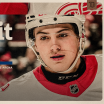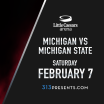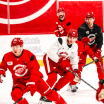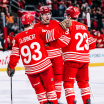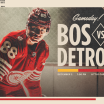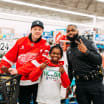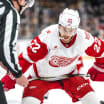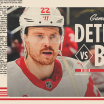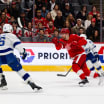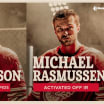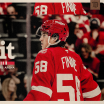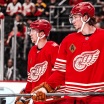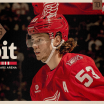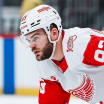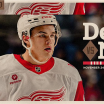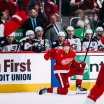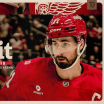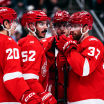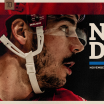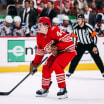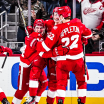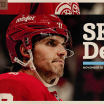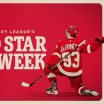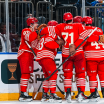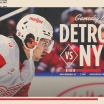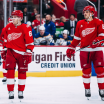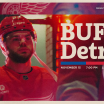DETROIT- Many of us have heard the story of how the Red Wings signed Joe Kocur out of a Detroit area beer league to play for the Wings back in the 1996-97 season.
It made for terrific newspaper copy and great conversation among Detroit's sports community since Kocur, along with Bob Probert, were the famed Bruise Brothers. They doled out their brand of frontier justice on the ice during the late 1980s and early 1990s as members of the Wings.
A tale of twists and turns
Car dealership and Bob Probert spurred Joe Kocur's comeback
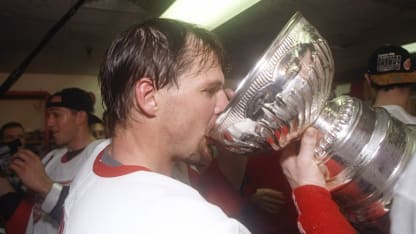
© Elsa/Getty Images
By
Arthur J.Regner @arthurjregner / DetroitRedWings.com
But the story, which has become part of Red Wings folklore, isn't as simple as, "Hey, Joey Kocur is playing in a beer league, Detroit should sign him."
It is a story rooted in a common friendship that a hockey coach and a player shared with a couple of car dealers.
THE CAR DEALERS
Kocur was traded to the New York Rangers in March of 1991 and the reign of the Bruise Brothers came to end, but a lifelong bond between the two men was cemented.
During his first stint with the Wings, Kocur developed a close friendship with car dealer Bob Moran and his sales manager, Jerry Vought.
Vought had a strong hockey background and as a youth played with Mark and Marty Howe on the Detroit Jr. Red Wings. His youngest son was a regular at Kocur's hockey camps at Lakeland Ice Arena.
When Scotty Bowman became head coach of the Wings, captain Steve Yzerman called Vought and asked him to set Bowman up with a ride.
Bob Moran's dealership, Art Moran in Southfield, had long been a provider of vehicles to many Wings players and the man that handled all the Wings accounts was Vought.
Soon Bowman was a regular at the dealership and like Kocur, he became good friends with Moran and Vought.
"Bob Moran was a terrific hockey supporter," Bowman said. "One day I was in there and Jerry (Vought), his sales manager, was a good friend of Joe Kocur. This was a great story. It was around Christmastime and Jerry says to me there's a guy who used to play for the Wings who wants to make a comeback - Joe Kocur.
"I didn't know much about Joey and I ran it through guys like Jimmy Devellano and Kenny Holland was there with us and they said, 'Well, you know he's a tough guy and he wants to start.'
"So Joey went down to the IHL (International Hockey League) for two weeks to see if he could get in shape enough to play and sure enough, Joey not only played, in the first series in '97 (Cup Final) against Philly he scored a beautiful breakaway goal.
"They had home ice, they were the favorite team, the Flyers, and Joey became really a strong defensive player and obviously a real tough player."
Moran and Vought remember having a conversation with Bowman about Kocur, but their memories differ slightly from his.
"Scotty had a habit of calling me first thing in the morning; he was renting a condo at Maple and Telegraph," Moran said. "He would come in almost every morning (to Art Moran) and get a cup of coffee and B.S. a little bit before he headed down to the rink. I can't remember exactly, but Scotty was talking about something on the team, I don't know if it was cohesiveness, but it was something about the team.
"To the best of my recollection, Scotty would ask me about a lot of different players, you know what they say or what they're like and I walked a fine line. I knew Steve (Yzerman) and a few of the other leaders on that team but you could tell something wasn't right."
Bowman was concerned about the Wings' toughness. Though he was never a real advocate of fighting, Bowman knew the Wings needed to upgrade their intimidation factor because he didn't want Detroit's stars to be moving targets on the ice.
Vought also remembers Bowman's daily morning visits to Art Moran. Many times Scotty would sit in Vought's office while he was doing a radio interview for a local morning show.
"All I can tell you is he came in virtually every single day in my office and we'd shoot the (breeze) about anything, whatever it was," Vought said. "Somehow or another Joey's name just came up and one thing led to another."
Regardless of how Kocur's name originally came up, it was Vought's eyewitness account of Kocur's strength that sold Bowman on reaching out to the former Bruise Brother.
"I told him a story about one of our mechanics, Bruce Castano," Vought said. "Joey had this pick-up truck that he had from us and they're trying to bend something; the part was solid iron and Bruce put it in a vice grip thing and Joey literally bent it with his bare hand to get it to fit. They were going to heat it up and knock it, but Joey says, 'Let me just try it.'
"So I'm telling Scotty this story and I say, 'He'd be an asset.'"
Once Vought is done telling his tale, Bowman asks him to fill him in on Kocur.
"Basically I told him, 'He's a great guy, a great player. I went to my son's training camp at Lakeland and he was in great shape,'" Vought said. "I told Scotty, 'He's still playing in a beer league, he's in shape.'
"And then Scotty asked, 'Do you have his phone number?' and I gave it to him."
Moran had known Kocur for a long time and sensed that Bowman truly didn't have a feel for Kocur as a player.
"He didn't know the respect the players had for him, what a solid guy he was," Moran said. "I think we just pitched him, 'What the hell do you have to lose?'
"At that time he was pretty much out of the game. Sign him to a 10-day contract or whatever deal they have and he ending up sticking and they won back-to-back Cups."
THE UNEMPLOYED TOUGH GUY
Kocur was out of work.
The Rangers traded him traded to the Vancouver Canucks in March of 1996 and the Canucks decided not to re-sign him, so Kocur began the 1996-97 hockey season back in Michigan, playing hockey for a beer league team in Lakeland and also with the Wings alumni team.
Despite not getting even one invite to an NHL training camp over the summer and into the early fall, Kocur continued to work out and was putting on "good pounds" (muscle). He was completely focused on getting back into the NHL.
"No one knows this part of the story," Kocur said. "I used to go down to a few of the games and one day I was parking in the players' lot and Mr. Ilitch for some reason was parking in the players' lot.
"I was wearing a golf shirt and he reached out his arm from the driver's side window and grabbed my arm and said, 'Wow, you're still ready to play, we've got to get you back!' I knew it was kind of tongue-in-cheek, but it was just nice that Mr. I said it."
On October 26, 1996, the Blackhawks were in town and Kocur was there to catch up with his buddy Probert after the game. He was feeling good about bumping into Mr. Ilitch and his urge to wear the red and white again was forefront in his mind.
Detroit and Chicago played to a 2-2 tie. Kocur was eager to talk to Probert because he wanted to deliver a message to his fellow Bruise Brother.
"I watched the game and after the game I am waiting for Probie and I said, tongue-in-cheek, telling him, 'Probie, you got to come in here next time and beat the (crap) out of these guys, you got to make sure they know they got to get tougher, help me get back into the league.' I was saying it tongue-in-cheek," Kocur said. "But the next time he came into Detroit, he speared Jamie Pushor, he fought (Brendan) Shanahan, he just ran rampant over the team. I don't know if he did it because I asked him to or if it was just the mood he was in that day.
"The next day in the newspaper, all the writers are writing about how the Red Wings need to get tougher and it was at that point Scotty called my agent and said, 'Tell Joe to get down in the minors and get in shape because we think we need to sign him back.'"
Whether Kocur was being "tongue-in-cheek" with Probert, he took it to heart.
Chicago's next game at Joe Louis was December 12, 1996. In the October game where Kocur had planted the seed, Probert had four penalty minutes. That was not the case in the December meeting.
As Kocur described, Probert was a one-man wrecking crew, accumulating 44 penalty minutes in a 6-2 Red Wings victory on that mid-December evening. But more importantly, Probert had set the stage for Kocur's return.
"So I ended up signing with a team called the San Antonio Dragons. It turned out they were on a two-week home stand right before Christmas," Kocur said. "I drove down there and played five or six games there and I flew back for Christmas, I probably flew on the 21st or 22nd.
"I am sitting with my wife on the night of the 23rd, I think it was, and I get a phone call and my wife says, 'it's for you' and I answer it, 'Hey, Joe, it's Scott Bowman.' I say, 'Mr. Bowman.' He then says, 'I want you to send someone to pick up all your stuff (in San Antonio), we're signing you to a contract.'"
Without question it was one of the best Christmas presents Kocur has ever received. Not only was he a Red Wing again, he was no longer a San Antonio Dragon, an experience which Kocur found unique.
"There was a guy in between the second and third periods, he came into the locker room and he was fitting guys for cowboy boots," Kocur recalled about his spell as a Dragon. "I remember one Saturday morning we had a really early practice and no coaches showed up, it was just players. It was quite different."
Kocur officially signed his contract with the Red Wings on December 27, 1996. His first day back in the room was the night of December 26. While he was working out and watching the Wings play Washington, he witnessed Sergei Fedorov's five-goal game.
Everything was falling into place, he knew his job and was ready to once again become Detroit's enforcer - or so he thought.
"The key point to this whole thing was when I did sign," Kocur said. "Scotty called me in to his office to meet, the first words out of his mouth were, 'I don't want you fighting.' I am thinking to myself, 'Isn't that why you signed me?'
"His reasoning was if you fight, you're in the penalty box and you're not able to protect anybody. He said, 'I want you always available. If they know if something goes on, at any point in time I can throw you over the boards.'
"So he actually really helped me in my career because my hand wasn't great at the time, but I was able to concentrate more on playing hockey and then when he put me and Drapes (Kris Draper) and Malts (Kirk Maltby) together and gave us that opportunity, that was amazing."
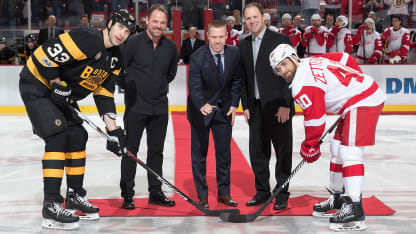
© Dave Reginek/Detroit Red Wings
On January 3, 1997, Kocur made his Wings debut against the Dallas Stars in a game played at Joe Louis Arena.
"Scotty comes in and he announces the starting lineup," Kocur said. "I think he announced Shanny (Brendan Shanahan), Stevie (Yzerman) and (Darren) McCarty, something like that, knowing if he announced my name I'd be too wound.
"So I am skating around the ice just before the national anthem and Budd Lynch is announcing the starting lineup and I was in the starting lineup.
"Sure enough, I start the game and I think (Todd) Harvey was the kid, I got an elbowing penalty the first shift of the game and the crowd went wild and all was good."
Kocur's second game back as a Wing was in Chicago. Kocur had a plan for a Bruise Brothers reunion on the ice, an altercation he viewed as destiny. That was the furthest thing from Probert's mind.
"Three minutes into the game, I'm lined up against Probie and I'm whacking him, trying to fight him and we end up having a good fight," Kocur said. "When the fight ended, I was laying on top of him, I looked down at him and said, 'Thanks for getting me back in the league.'
"Years later we're writing a book (The Bruise Brothers) and I'm telling this exact story and Probie looks over at me and says, "(Expletive), I wondered why you wanted to fight me?' I say, 'Probie, they brought me back to fight you.' He never understood why I fought him that game."
When Kocur returned to the Wings, he was already a Stanley Cup Champion, having won with the Rangers in 1994. He was a different player this time around; he sensed it and so did his Detroit teammates.
"It was awesome," Kocur said about his return to Detroit. "Even a guy like Sergei who I only played part of the year with ('90-91 before the trade to the Rangers), he looked up to me as a, if you want to say it, maybe a slight father figure, a big brother.
"I had been away, I had some success, it just wasn't the same person coming back. They saw me as a different person and I really loved it."
As a Ranger he played with seven or eight Edmonton Oilers, all of whom had won the Stanley Cup. They taught the Rangers how to win. Players such as Mark Messier, Kevin Lowe, Glenn Anderson and Craig MacTavish had a profound impact on Kocur and his New York mates. He passed that knowledge onto the Wings.
"Mark Messier taught us in New York was everyone seems to be scared to say shutout or scared to talk about the Stanley Cup," Kocur said. "And the first thing he says is, 'We're here to win a Stanley Cup and that's it. Talk about it, embrace it, don't be scared to talk about it.'
"We talked about it with the Red Wings. 'Let's go out and win the Stanley Cup, let's not win the President's Trophy, let's not win the first round, let's win the Stanley Cup. How do we get there? Yeah, we have to win all the way up, but let's set an end goal right away.'
"The guys when I came back were so much better and so much more confident anyway. Everyone says that Colorado game really changed the tone and the best thing about that Colorado game was I wasn't even playing in the game, so they got to do it all on their own without the new guy there, you know what I mean?"
Since they won the Stanley Cup in 1997, many fine players have left their mark on the franchise. Kocur's influence on the Red Wings is understated.
From the Bruise Brothers to the Grind Line, he has always given everything he had for his team, his fans and his city. He embodies the spirit of Detroit, an adopted son of the Motor City and like many Detroiters, he's a bit calculating, too.
"I used to go in and see Bob (Moran) a lot and we'd always be joking around like, "Bob, the next time Scotty's in here tell him I need a job, I got to work," Kocur said. "So I would say that to Jerry and Bob all the time, 'Make sure you tell Scotty I am ready to play.'"
Bowman enjoys telling the story of how Kocur returned to the Red Wings; it is part of what made his time in Detroit so memorable.
"Imagine getting a player on the recommendation of a car dealer," Bowman said. "I always used to talk to Bob Moran and thank him and Jerry for the fact if it wasn't for those guys saying, 'Look, he wants to come back.' All those little pieces, I feel we were so lucky."
Luck was a factor in Kocur's return, a lot of cards had to fall into place, but the Red Wings were fortunate Kocur not only cut the cards, he shuffled the deck and dealt himself the perfect hand.


